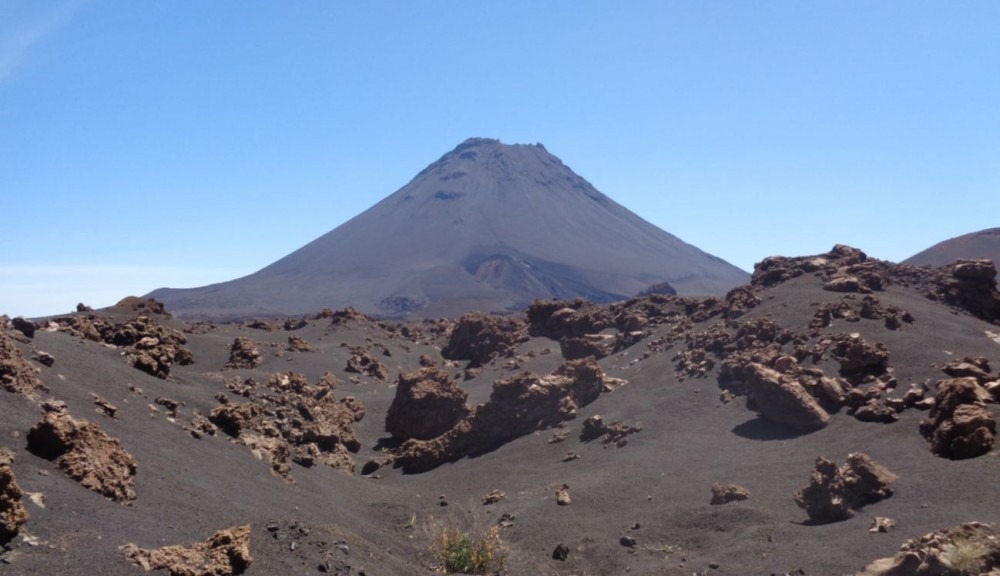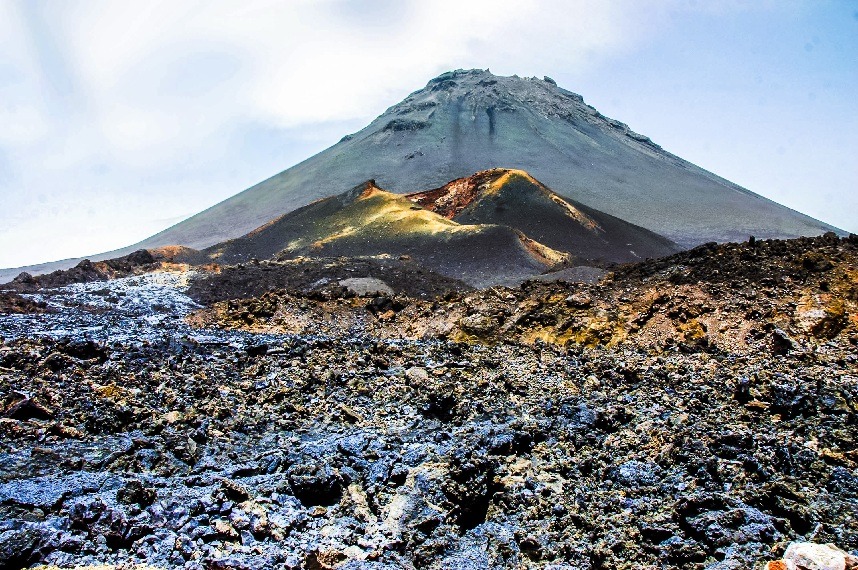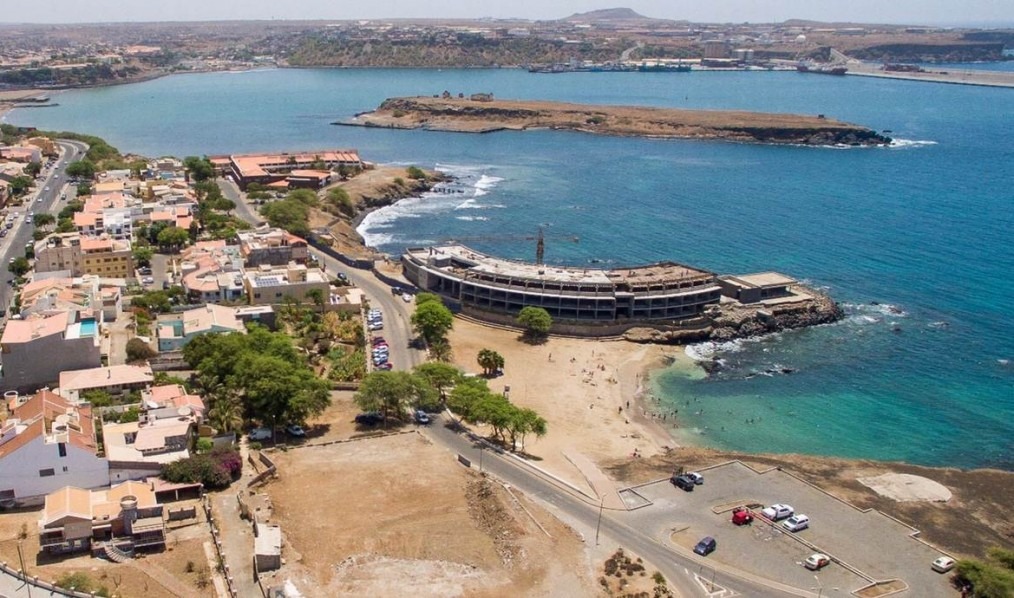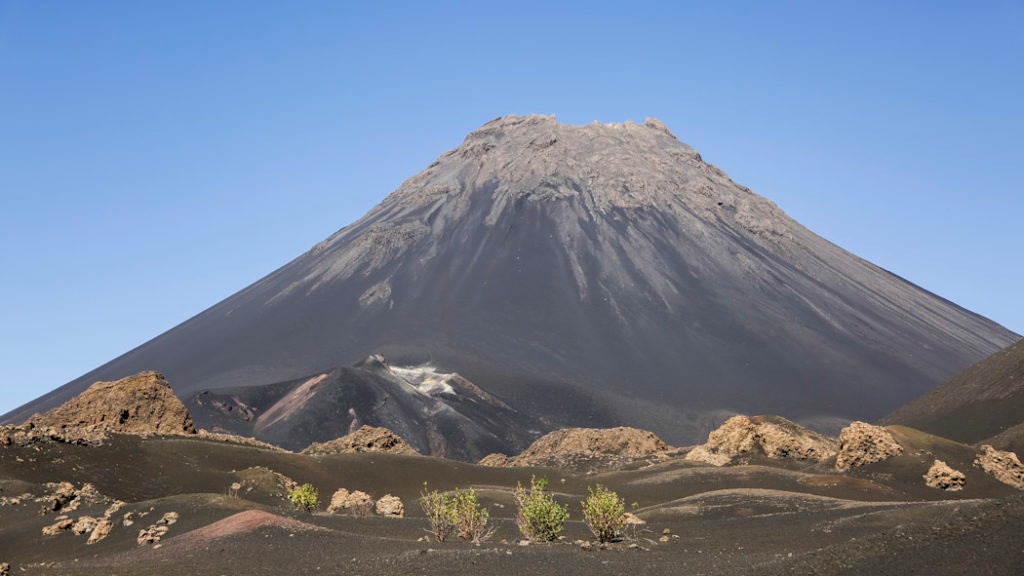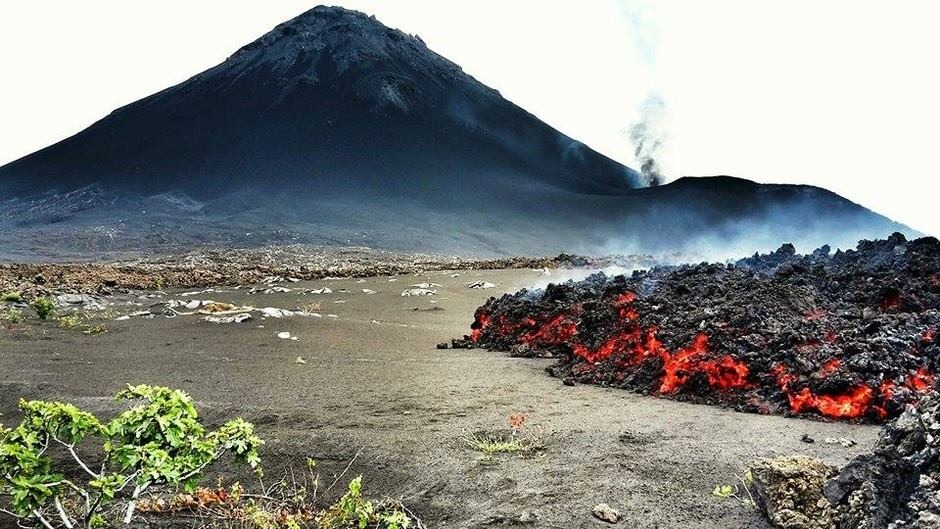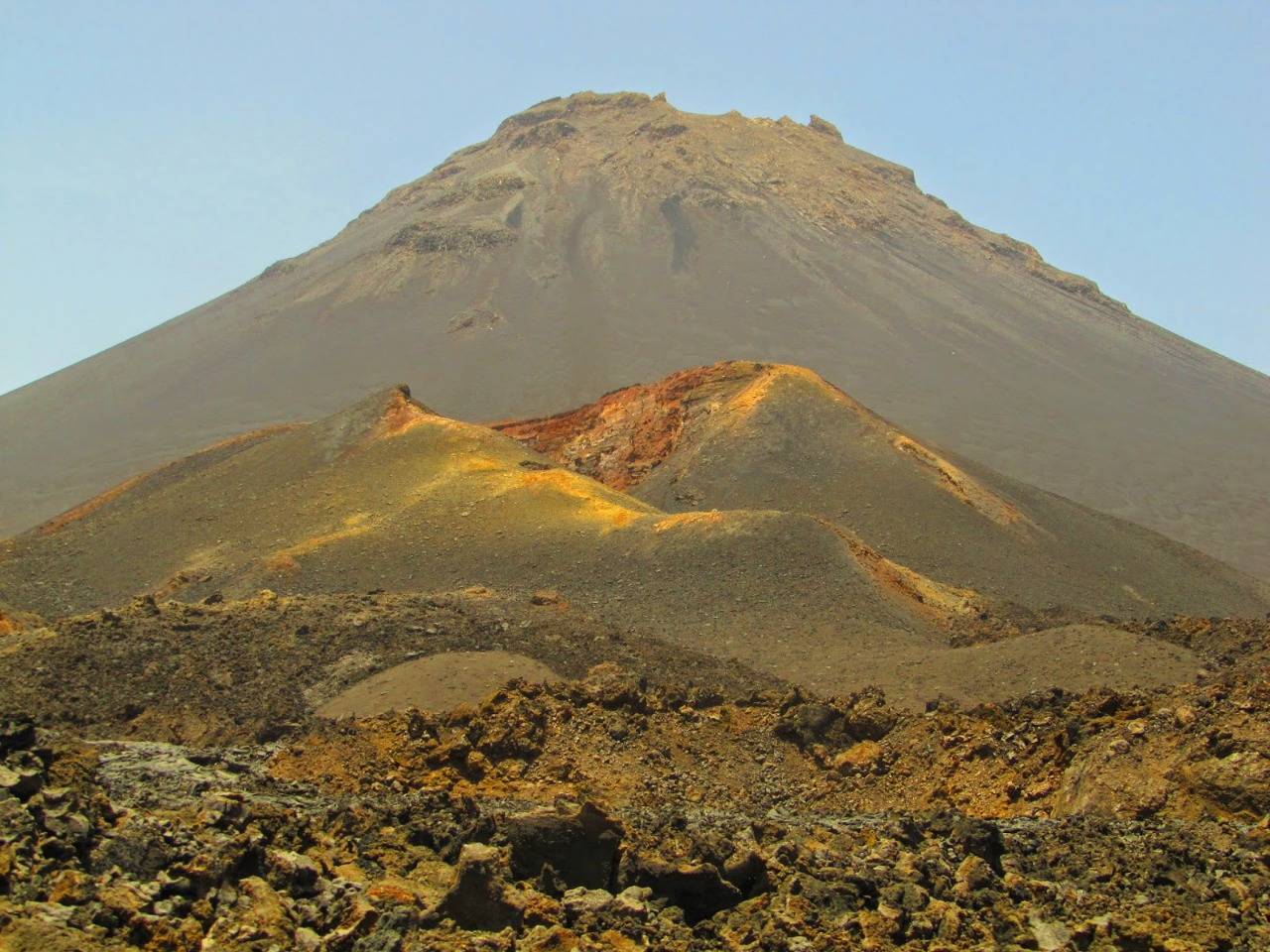Fotos de: Ilha do Fogo, Cabo Verde
Mapa de localização
Aeroportos
Hotéis e outros Alojamentos
O que visitar
Onde Comer
World Nomads
O Seguro de viagem com as maiores coberturas

O Seguro de viagem com as maiores coberturas

Ilha do Fogo
Djarfogo, significa Ilha do Fogo, uma das dez ilhas de Cabo Verde, uma das mais belas, é a ilha mais proeminente do grupo de Sotavento de Cabo Verde elevando-se a quase 3.000 m (10.000 pés) acima do nível do mar no seu cume, Pico do Fogo.
Foi a segunda ilha a ser descoberta pelos navegadores portugueses a 1 de Maio de 1640, inicialmente designada por São Filipe mais tarde passada a ser identificada, com mais propriedade, por Fogo.
Toda a ilha é um primitivo vulcão ainda activo, com a última erupção a ocorrer em 1995.
O vulcão da ilha do Fogo tem aproximadamente 2829 metros, convidando a uma escalada de 3 a 4 horas até à imensa e belíssima cratera de Chã das Caldeiras, caldeira de 8 kms de diâmetro no lado ocidental, as paredes atingem 1000 metros, com uma cratera de 500 metros de diâmetro, e uma profundidade de 180 metros
Em Chã das Caldeiras reside uma comunidade com características físicas muito particulares. Descendentes de um francês de apelido Montrond apresentam pele e olhos claros e cabelos crespos e loiros.
São Filipe, a capital da ilha, encontra-se virada para o mar com vista para a vizinha ilha da Brava.
As suas ruelas pavimentadas, com os seus numerosos jardins de árvores e flores e as suas casas antigas tipo colonial, os sobrados, marcam as caraterísticas essenciais da ilha emanando atração e charme.
Foi a segunda ilha a ser descoberta pelos navegadores portugueses a 1 de Maio de 1640, inicialmente designada por São Filipe mais tarde passada a ser identificada, com mais propriedade, por Fogo.
Toda a ilha é um primitivo vulcão ainda activo, com a última erupção a ocorrer em 1995.
O vulcão da ilha do Fogo tem aproximadamente 2829 metros, convidando a uma escalada de 3 a 4 horas até à imensa e belíssima cratera de Chã das Caldeiras, caldeira de 8 kms de diâmetro no lado ocidental, as paredes atingem 1000 metros, com uma cratera de 500 metros de diâmetro, e uma profundidade de 180 metros
Em Chã das Caldeiras reside uma comunidade com características físicas muito particulares. Descendentes de um francês de apelido Montrond apresentam pele e olhos claros e cabelos crespos e loiros.
São Filipe, a capital da ilha, encontra-se virada para o mar com vista para a vizinha ilha da Brava.
As suas ruelas pavimentadas, com os seus numerosos jardins de árvores e flores e as suas casas antigas tipo colonial, os sobrados, marcam as caraterísticas essenciais da ilha emanando atração e charme.
Turismo
Majestosa, crescendo em volta de um vulcão ainda ativo, convida os amantes de caminhadas.
O vulcão, imponente, tanto pela sua dimensão como pela sua beleza é sem dúvida a maior atração turística da ilha. São ainda de interesse turístico o Monte Velha e a sua floresta, e as Salinas de São Jorge a que se juntam as praias de areia negra com lindos corais e algas marinhas, para mergulho à superfície e a grandes profundidades.
São também atrações turísticas a celebração do dia de São Filipe (1 de Maio), padroeiro do Município com o mesmo nome, é a principal festa na ilha do Fogo.
Comandada, desde sempre, pelas famílias mais abastadas, que uma a uma se vão sucedendo na responsabilidade de organização anual da Festa de São Filipe, sucedem-se os cortejos e procissões, acompanhadas pelas caraterísticas corridas de cavalos e provas de perícia dos seus cavaleiros, tradição que perdura desde 1940, sempre sob a égide da Bandeira.
Por esta ocasião acorrem a São Filipe gentes de todo o arquipélago e mesmo foguenses emigrados que aproveitam para rever as suas famílias. A festa, que antes da independência, em 1975, não tinha a projeção atual, é hoje, uma das mais importantes de Cabo Verde, termina com a transmissão da Bandeira à família que organizará o evento do ano seguinte.
O dia de São João (24 de Junho), lembrado em todas as ilhas do arquipélago, é também uma festa importante na ilha.
O vulcão, imponente, tanto pela sua dimensão como pela sua beleza é sem dúvida a maior atração turística da ilha. São ainda de interesse turístico o Monte Velha e a sua floresta, e as Salinas de São Jorge a que se juntam as praias de areia negra com lindos corais e algas marinhas, para mergulho à superfície e a grandes profundidades.
São também atrações turísticas a celebração do dia de São Filipe (1 de Maio), padroeiro do Município com o mesmo nome, é a principal festa na ilha do Fogo.
Comandada, desde sempre, pelas famílias mais abastadas, que uma a uma se vão sucedendo na responsabilidade de organização anual da Festa de São Filipe, sucedem-se os cortejos e procissões, acompanhadas pelas caraterísticas corridas de cavalos e provas de perícia dos seus cavaleiros, tradição que perdura desde 1940, sempre sob a égide da Bandeira.
Por esta ocasião acorrem a São Filipe gentes de todo o arquipélago e mesmo foguenses emigrados que aproveitam para rever as suas famílias. A festa, que antes da independência, em 1975, não tinha a projeção atual, é hoje, uma das mais importantes de Cabo Verde, termina com a transmissão da Bandeira à família que organizará o evento do ano seguinte.
O dia de São João (24 de Junho), lembrado em todas as ilhas do arquipélago, é também uma festa importante na ilha.
Gastronomia
Dos diversos pratos tradicionais a Djagacida (confecionado através de farinha de milho e feijão), Xerém de festa (servido principalmente nas festas de Bandeira e de casamento, acompanhado de guisado de carne), Cachupa, Camoca, Gufongo (tipo de pão feito a partir de farinha de milho) constituem referências gastronómicas que merecem ser apreciadas pelos visitantes.
Em Chã-das-Caldeiras há uma variedade de produtos, tais como o vinho regional, uvas, queijos, maçã, entre outros. Esta ilha lhe oferece uma variedade de pratos típicos exclusivos, pois aqui as condições naturais são propícias para o desenvolvimento dos produtos agrícolas e não só.
Em Chã-das-Caldeiras há uma variedade de produtos, tais como o vinho regional, uvas, queijos, maçã, entre outros. Esta ilha lhe oferece uma variedade de pratos típicos exclusivos, pois aqui as condições naturais são propícias para o desenvolvimento dos produtos agrícolas e não só.
Clima
O clima da Ilha do Fogo é tipicamente tropical, com temperaturas bastante quentes durante todo o ano.
Como uma das três ilhas mais acidentadas, beneficia de maior pluviosidade.
De novembro a julho está seco enquanto de agosto a outubro é a "estação das chuvas".
Como uma das três ilhas mais acidentadas, beneficia de maior pluviosidade.
De novembro a julho está seco enquanto de agosto a outubro é a "estação das chuvas".
Outros destinos turísticos em:
Cabo Verde
Cabo Verde
Outros destinos turísticos mundiais
Porquê reservar com TURISMO & VIAGENS
Os melhores preços
As nossas parcerias com os maiores operadores mundiais, oferecem uma pesquisa dos melhores preços de mercado.
Mais opções
No Rotas Turísticas pode reservar o hotel, comprar a passagem aérea, reservar o transfer do aeroporto para o hotel e vice-versa, reservar as excursões locais, alugar o carro, fazer o seguro de viagem e consultar os locais a visitar e onde ir
Dicas & Destinos de férias
Centenas de destinos de férias com todas as opções que lhe permitem facilmente escolher o destino que melhor combina com as suas férias de sonho.
TURISMO & VIAGENS
Links

